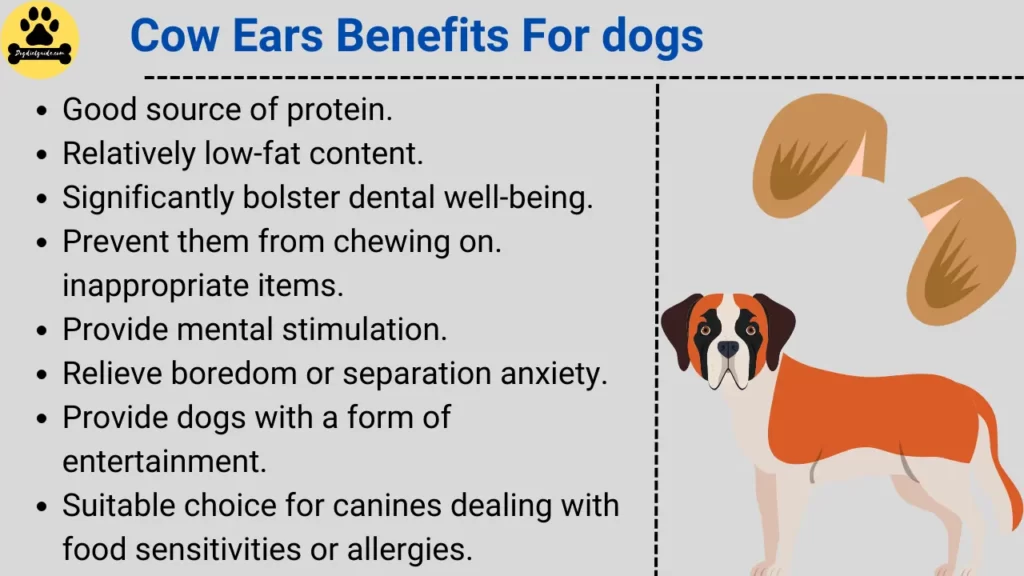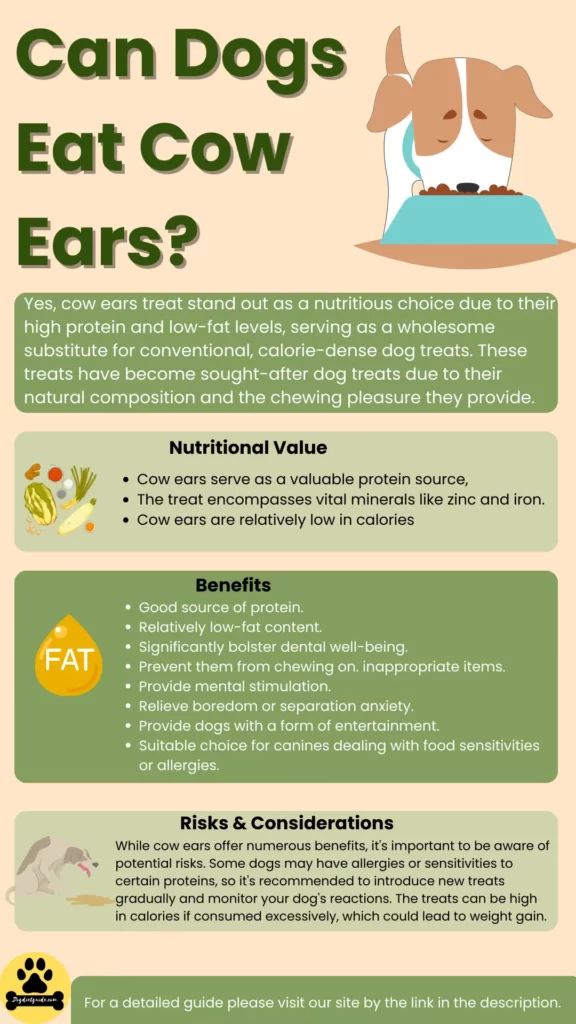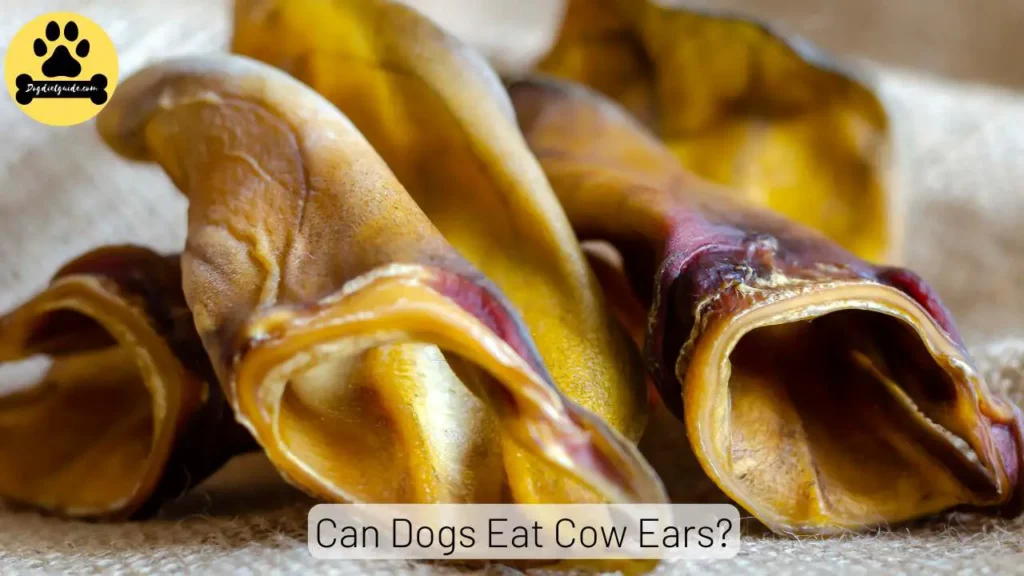As devoted pet owners, we always strive to provide our beloved furry companions with the best nutrition. Amidst the myriad of dog treats and chews available, one question often arises: Can dogs eat cow ears? This seemingly simple inquiry delves into the complexities of canine dietary needs and safety concerns.
Can Dogs Eat Cow Ears?
Yes, cow ears treat stand out as a nutritious choice due to their high protein and low-fat levels, serving as a wholesome substitute for conventional, calorie-dense dog treats. These treats have become sought-after dog treats due to their natural composition and the chewing pleasure they provide.
Their tough texture can also help promote dental hygiene by reducing plaque and tartar buildup as dogs gnaw on them.
Nutritional Value of Cow Ears
Cow ears for dogs serve as a valuable protein source, playing a crucial role in upholding a dog’s muscle mass, skin condition, and coat health.
The treat encompasses vital minerals like zinc and iron, which actively contribute to the holistic well-being of your canine companion.
Moreover, cow ears are relatively low in calories, making them a suitable option for dogs on weight management plans.
Risks & Considerations

Is cow ears treat safe for dogs? While cow ears offer numerous benefits, it’s important to be aware of potential risks. Some dogs may have allergies or sensitivities to certain proteins, so it’s recommended to introduce new treats gradually and monitor your dog’s reactions.
The treats can be high in calories if consumed excessively, which could lead to weight gain.
Cow Years Benefits For Dogs
-
Cow ears are a source of protein, which is essential for the overall health and well-being of dogs.
-
Stand out with their relatively low-fat content in comparison to certain other dog treats.
-
Engaging in the act of chewing cow ears can significantly bolster dental well-being by diminishing the accumulation of plaque and tartar on teeth.
-
Prevent them from chewing on inappropriate items around the house.
-
Provide mental stimulation for dogs, keeping them engaged and occupied.
-
Advantageous for dogs that are susceptible to bouts of boredom or separation anxiety.
-
Minimally processed and free from artificial additives, preservatives, and fillers, making them a more natural option for dog treats.
-
Provide dogs with a form of entertainment and distraction, which can be particularly useful during times when they need to be calm and settled.
-
Suitable choice for canines dealing with food sensitivities or allergies.

Are Cows Ears Good For Dogs?
Cows’ ears are good for dogs and sometimes given as a treat or chew toy. They are made of cartilage, which makes them a durable option for dogs to chew on. Chewing can help satisfy a dog’s natural urge to gnaw, clean their teeth, and provide mental stimulation.
However, there are a few important considerations to keep in mind:
Digestibility
It’s important to note that they could pose digestion challenges for certain pets, particularly if they ingest sizable fragments.
It’s important to monitor your pup while chewing and remove any small or sharp fragments that could pose a choking hazard.
Calories & Portion Control
Cows’ ears are often high in calories, so if your furry friend is on a specific diet or has weight concerns, you should consider this when offering them as a treat.
Overindulgence can lead to weight gain.
Allergies & Sensitivities
Some dogs might be allergic to certain proteins in cows’ ears.
If your pup possess a track record of food allergies or sensitivities, seeking advice from your veterinarian before introducing novel treats is a prudent course of action.
Variety & Balance
Providing a well-rounded diet for your dog that includes proper nutrition from their regular meals is important. Treats should only make up a small portion of their overall calorie intake.
Related Post: What to Do if Your Dog Ate Parchment Paper?
How Many Calories Are In Cow Ears For Dogs?
A single cow ear can average contain anywhere from 40-50 (383 kcal/100g) calories. It’s crucial to remember that this serves as a rough estimate, and the precise calorie content may vary depending on the specific product and brand.
If you’re concerned about your dog’s calorie intake, it’s a good idea to check the packaging or consult a veterinarian for more accurate information.
It’s also important to give the treat to your dog in moderation, as they can be high in calories and fat.
Feeding Guidelines
When offering cow ears to your dog, moderation is key.
These treats should be an occasional addition to your dog’s regular diet rather than a daily staple.
Consider offering half or a whole cow ear as a treat depending on your dog’s size.
For tailored portion sizing that aligns with your dog’s unique requirements, it’s advisable to consistently seek guidance from your veterinarian.
How Often Can Dogs Have Cow Ears?
Dogs can typically have cow ears as an occasional treat, about 1 to 3 times per week. However, it’s important to consider your dog’s health, size, and dietary needs.
Always monitor your dog’s reaction to cow ears and consult your veterinarian if you’re unsure about the appropriate frequency for your dog.
Which Dogs Should Not Eat Cow Ears?
-
Dogs with Food Allergies
-
Dogs with Digestive Issues
-
Puppies
-
Aggressive Chewers
-
Small Breeds
-
Dogs with Dental Problems
-
Obese Pets
-
Canines with Pancreatitis
Related Post: Can Dogs Have Miso Soup?
Other Alternatives
If you’re uncertain about introducing cow ears into your dog’s diet, plenty of alternative treats are available.
Popular options include dental chews designed to support oral health and other protein-rich treats like jerky made from lean meats. Select treats that are exclusively designed for canines, steering clear of those that incorporate detrimental additives or an excessive amount of preservatives.
FAQs
What Are Cow Ears For Dogs Made Of?
Cow ears for dogs are typically made from the skin of a cow’s ear. They are cleaned, dried, and sometimes smoked to enhance flavor. The process may involve removing excess hair and cartilage, resulting in a chewy and crunchy dog treat.
Are Cow Ears For Dogs Real Cow Ears?
Yes, cow ears for dogs are made from real cow ears. The ears undergo a processing and drying procedure to make them safe and suitable for dogs to chew on.
What Age Can Puppies Have Cow Ears?
Puppies usually start having cow ears as treats when they are around 3 to 4 months old and have developed some adult teeth. However, always consult your veterinarian before introducing new treats into your puppy’s diet, as individual needs can vary based on breed, size, and health considerations.
Final Thoughts: Can Dogs Eat Cow Ears?
In conclusion, cow ears can be a wholesome and enjoyable treat for your dog when offered in moderation and under proper supervision. Their nutritional value and dental benefits make them a favorable option for many pet owners.
However, remember that every pup is unique, so it’s essential to consider your pet’s specific dietary needs, allergies, and sensitivities.
Through informed decision-making and collaboration with your veterinarian, you can guarantee that your cherished companion receives optimal treats that contribute to their well-being and contentment.

Resources:




![Can Dogs Eat Blood? 7 Side Effects [Expert Opinion]](https://petskor.com/wp-content/uploads/2022/04/Webp.net-resizeimage-12.jpg)
